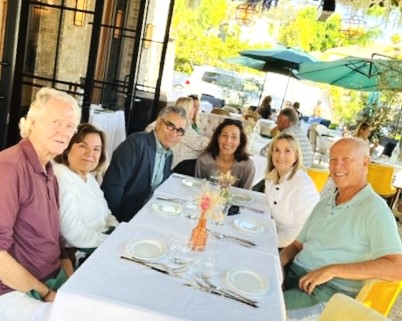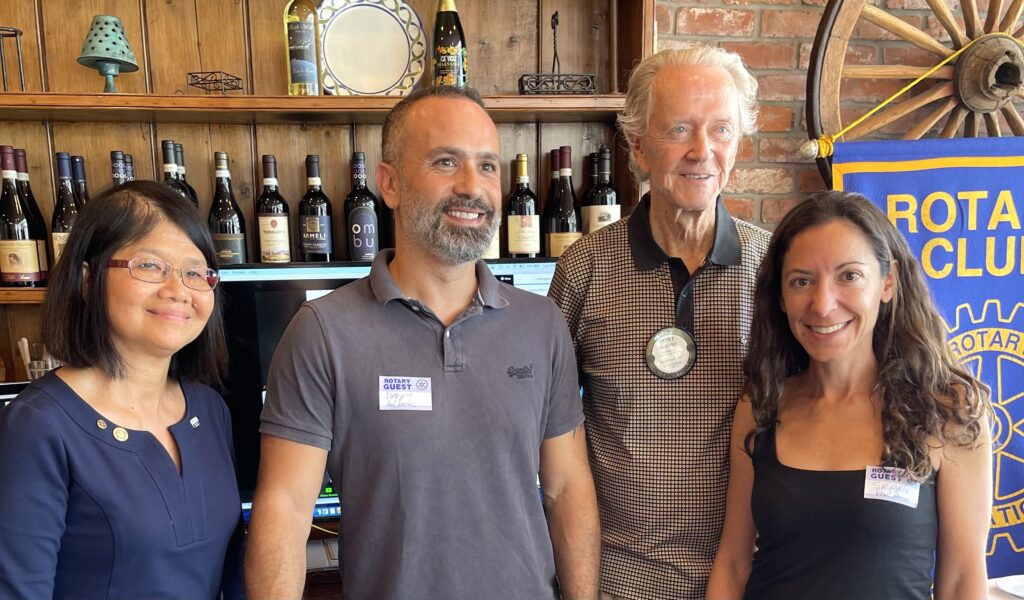
(Left to right) Perry and Methal Akins, Eugene Levy, Maryam Zar, Deb Levy and Steve Cron dine at The Draycott.
Palisades Honorary Mayor Eugene Levy, comic and Emmy winner for Schitt’s Creek, agreed to dine for charity, helping raise money for local youth causes. Last year, the Palisades Rotary Club sold 100 tickets ($100 each) for the opportunity to share a meal with the star.
At a drawing, Maryam Zar, the current Pacific Palisades Community Council President, was the lucky winner.
Zar received a special coffee-table book, “Best Wishes, Warmest Regards: The Story of Schitt’s Creek,” written by Eugene and his son Daniel. Now almost a year later, she sat down with Levy and his wife Deb at The Draycott, in Pacific Palisades. She was joined by Highlands’ resident Steve Cron, and Rotary representative Perry Akins and his wife Methal.
The event raised nearly $10,000. Half of the money was given to the Palisades YMCA for scholarships and the other half is being used for community youth projects.
Rotary Youth Services chair Perry Akins said, “An area of particular interest for committee is the students in our public schools.” In addition to the YMCA, the club donated to the newly formed robotics club at Paul Revere Middle School and to help with purchasing band uniforms at Palisades High School.
Revere’s Robotic Team Receives Money

Rotary President Marie Tran (left) watched as the Revere Robotics team representatives Danny Moghnie and Sarah Wood accepted a check to aid the newly-formed program. Rotary Youth Services Chair is Perry Akins ( second from the right). The meeting was held at Modo Mio.
The Rotary Club voted to fund two VEXIQ competition kits for the newly-formed Paul Revere Middle School Robotics team.
Rotary Youth Services chair Perry Akins said “The club is always on the lookout for opportunities to be of service in our community.”
The club’s founder Sarah Wood is the parent of a Revere seventh grader. She said that each kit costs $649 and allows a student to build a robot with sensors and a motor that can be driven remotely as well as programed with either block coding or Python programming language to move autonomously through the competition field to perform specific tasks.
“We have 19 students, including 6th, 7th, and 8th graders, and we have split them into 3 separate teams for the purpose of robot building and competition,” Wood said, noting that team registration for competition events also cost money.
“We registered for the LAUSD West VEXIQ League, which competes against other LAUSD schools,” she said.
Three qualifying competitions and one championships competition are held. “We missed the first competition mostly because the VEXIQ competition robotic kits were backordered, but also because it took me a time to research and learn about the program, recruit volunteer coaches, get funding, and get our team organized,” Wood said. “We should make the second competition, although our robots may be very basic due to the time crunch.
“I learned that if you really want something new at the school, you have to get involved and make it happen yourself,” said Wood, who continues to sort through the logistics.
Additional expenses that have occurred was a lockable storage cabinet for equipment and lockable robot carriers. Wood said that ideally, there would be five or less students on a team, but “we wanted to be inclusive,” and extra money would be needed for more kits.
“The real issue we have though is not simply funding, but that we are relying on parent volunteers for coaching,” Wood said, noting there are two dedicated parent coaches Danny Moghnie and Joe McKelheer, but another volunteer to help with coaching is needed.
“My hope is that someday, the Revere Robotics team can find a dedicated robotics lab or space on campus in which to store the robotics equipment so that it doesn’t have to completely broken down after use, as well as find and fund a dedicated staff member to supervise the students from the robotics team in that space during lunch and/or after school on the days in between the weekly team meetings,” Wood said and added that the program is important because “it draws in students with certain interests and skill sets, and offers a way for them to meet and get to know like-minded kids, while providing them with an opportunity to build their technical skills and confidence and work together towards a shared end goal of competing with and improving on their robots and code.”
Coach Danny Moghnie, who has a son in seventh grade said, “I’ve been programing since I was 14 years old and I’m lucky to have turned my hobby into a career.” He has a bachelor’s degree in computer engineering and a master’s degree in software engineering.
“Software is embedded in every aspect of our daily lives, and it is important to understand the technology that controls so much of the things we rely on,” Moghnie said. “The majority of people use technology as consumers, I try to encourage my kids to be creators.
“What’s important about robotics is that it encompasses many engineering fields and has obvious real life uses,” Moghnie said. “The importance of the club is a safe space for likeminded kids to work towards a shared goal.
“We have this idea that programming in particular and technology is a solo endeavor,” he said. “STEM is a team endeavor and communicating your ideas as well as collaborating with others to achieve a common goal is essential for any meaningful problem in the field. A club where kids are first taught to cooperate, divide tasks and resolve conflicts is an essential skill.”
